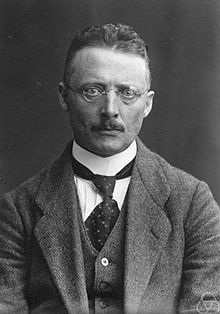Ernst Sigismund Fischer
You can help expand this article with text translated from the corresponding article in German. (February 2010) Click [show] for important translation instructions.
|
Ernst S. Fischer | |
|---|---|
 ca. 1920 | |
| Born | 12 July 1875 |
| Died | 14 November 1954 (aged 79) |
| Nationality | Austria |
| Alma mater | University of Vienna |
| Known for | Riesz–Fischer theorem Fischer's inequality |
| Spouse | Ellis Strauss |
| Children | Ursula |
| Scientific career | |
| Fields | Mathematics |
| Institutions | University of Cologne |
| Thesis | Zur Theorie der Determinanten (1899) |
| Doctoral advisor | Franz Mertens Leopold Gegenbauer |
Ernst Sigismund Fischer (12 July 1875 – 14 November 1954) was a mathematician born in Vienna, Austria. He worked alongside both Mertens and Minkowski at the Universities of Vienna and Zurich, respectively. He later became professor at the University of Erlangen, where he worked with Emmy Noether.
His main area of research was mathematical analysis, specifically orthonormal sequences of functions which laid groundwork for the emergence of the concept of a Hilbert space.
The Riesz–Fischer theorem in Lebesgue integration is named in his honour.
He is the grandson of composer Karl Graedener.[1]
References
- ^ Ernst Sigismund Fischer http://www-history.mcs.st-andrews.ac.uk/Biographies/Fischer.html.
External links
- O'Connor, John J.; Robertson, Edmund F., "Ernst Sigismund Fischer", MacTutor History of Mathematics Archive, University of St Andrews
- Ernst Sigismund Fischer at the Mathematics Genealogy Project
